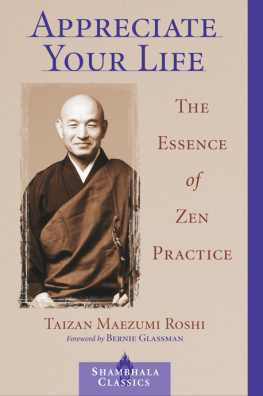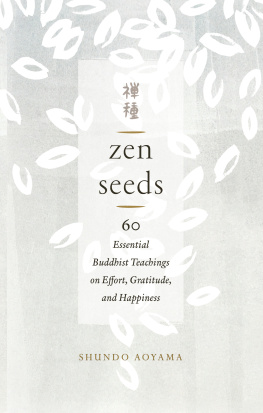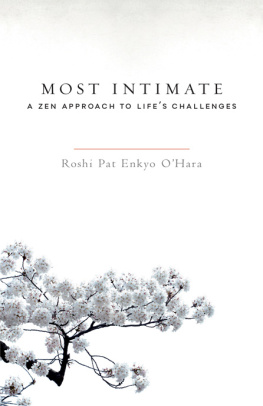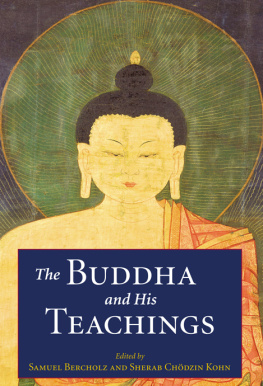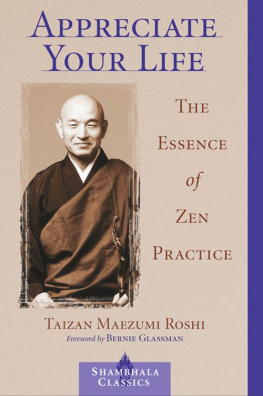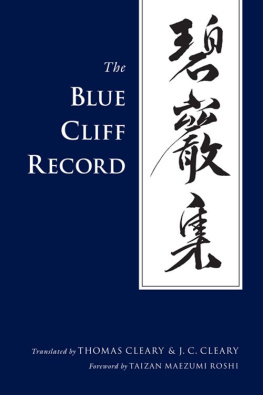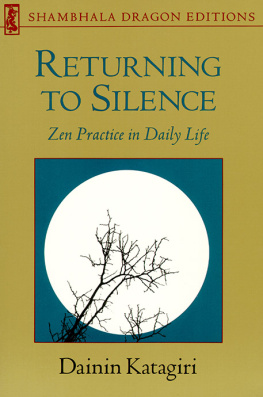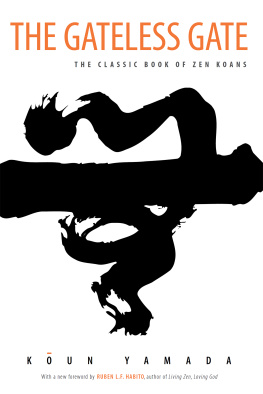A brilliant, simple, infinitely subtle appreciation of this precious life.
Peter Matthiessen, author of The Snow Leopard
With a loving heart, Maezumi Roshi carried these teachings in his two hands across the ocean to offer to the West. Now you hold them in your hands, the subtle, profound, enigmatic Zen that awakens trust in your own true nature. Enjoy.
Jack Kornfield, author of A Path with Heart and After the Ecstasy, the Laundry
We are fortunate, with Appreciate Your Life, to finally have a volume that evokes the voice and broad-minded teaching that have meant so much to all of us in Western Zen.
Zoketsu Norman Fischer, senior dharma teacher at the San Francisco Zen Center
Maezumi Roshis dharma is gentle, generous, accessible, humorous, and above all encouraging.
Robert Aitken, author of Taking the Path of Zen and Original Dwelling Place
ABOUT THE BOOK
Here is the first major collection of the teachings of Taizan Maezumi Roshi (19311995), one of the first Japanese Zen masters to bring Zen to the West and founding abbot of the Zen Center of Los Angeles and Zen Mountain Center in Idyllwild, California. These short, inspiring readings illuminate Zen practice in simple, eloquent language. Topics include zazen and Zen koans, how to appreciate your life as the life of the Buddha, and the essential matter of life and death.
Appreciate Your Life conveys Maezumi Roshis unique spirit and teaching style, as well as his timeless insights into the practice of Zen. Never satisfied with merely conveying ideas, his teisho, the Zen talks he gave weekly and during retreats, evoked personal questions from his students. Maezumi Roshi insisted that his students address these questions in their own lives. As he often said, Be intimate with your life.
The readings are not teachings or instructions in the traditional sense. They are transcriptions of the masters teisho, living presentations of his direct experience of Zen realization. These teisho are crystalline offerings of Zen insight intended to reach beyond the students intellect to her or his deepest essence.
TAIZAN MAEZUMI ROSHI (19311995) was a seminal figure in the transmission of Zen Buddhism to the West. He was founding abbot of the Zen Center of Los Angeles (ZCLA) from 1967 to 1995 and of Zen Mountain Center from 1978 to 1995. He and his successors also founded Zen centers throughout the United States, Europe, and Mexico. Maezumi Roshi established The Kuroda Institute for the Study of Buddhism and Human Values, which promotes Buddhist scholarship and publishes, with the University of Hawaii Press, translations of East Asian Buddhist classics. He coauthored On Zen Practice: Foundation of Practice, On Zen Practice II: Body, Breath and Mind, and The Hazy Moon of Enlightenment. He also provided the commentary for The Way of Everyday Life: Zen Master Dogens Genjokoan.
Sign up to learn more about our books and receive special offers from Shambhala Publications.

Or visit us online to sign up at shambhala.com/eshambhala.
APPRECIATE YOUR LIFE
THE ESSENCE OF ZEN PRACTICE
Taizan Maezumi
EDITED BY
Wendy Egyoku Nakao AND Eve Myonen Marko
FOREWORD BY
Bernie Glassman

SHAMBHALA
Boston & London
2013
Shambhala Publications, Inc.
Horticultural Hall
300 Massachusetts Avenue
Boston, Massachusetts 02115
www.shambhala.com
2001 by White Plum Asanga, Inc.
All rights reserved. No part of this book may be reproduced in any form or by any means, electronic or mechanical, including photocopying, recording, or by any information storage and retrieval system, without permission in writing from the publisher.
The Library of Congress catalogues the hardcover edition as: Maezumi, Hakuyu Taizan.
Appreciate your life: the essence of Zen practice / Taizan Maezumi; edited by Wendy Egyoku Nakao and Eve Myonen Marko; foreword by Bernie Glassman.1st ed.
p. cm.
Includes bibliographical references and index.
1. Spiritual lifeZen buddhism. I. Nakao, Wendy Egyoku. II. Marko, Eve Myonen. III. Title.
eISBN 978-0-8348-2819-3
ISBN 1-57062-228-0 (hardcover)
ISBN 1-57062-916-1 (paperback)
BQ9288.M3 2001
294.3444dc21
00-046358
PHOTO CREDITS
Emmett Ho, cover
Zen Center of Los Angeles, Part One
Jim Whiteside, Part Two
Zen Center of Los Angeles, Part Three
CONTENTS
I LIKE TO TELL THE STORY of how I met my teacher, Hakuyu Taizan Maezumi, for the first time. In 1963, after several years of sitting meditation on my own, I wanted to sit with a group, maybe even find a teacher. So I went to the only place I knew of in Los Angeles that had sitting meditation, which was Zenshuji, the Soto Zen temple in Little Tokyo and home to the Soto Zen bishop for North America. The temple served the needs of the Japanese-American Buddhist community by holding Zen Buddhist services, particularly funeral services. It also had a sitting group made up mostly of Caucasian Americans like myself.
One day our group did a zazenkai, or a one-day retreat. I noted that the abbot of the temple, who hardly spoke English, was attended by a young Japanese monk. At the end of the day we all drank tea together, and at that time I asked the abbot why we did kinhin, or walking meditation, between periods of zazen, sitting meditation. Instead of answering, he motioned to his young attendant, who said simply, When we walk, we just walk.
The young attendant was Taizan Maezumi, and those were his first words to me. Those were also his last words to me for about five years, for I didnt return to Zenshuji. Less than twenty years had passed since the time of the internment of Japanese Americans during World War II, and some of us Caucasian Americans who were interested in sitting meditation found less than a warm welcome when we entered Japanese-American temples. Cultures and memories clashed. Purposes, too. For most Japanese Americans, Buddhism meant what Western religions mean to most Westerners who attend church or synagogue: ritual, the celebration of individual and family milestones, the pulling together of a community. We Caucasians, on the other hand, came for different reasons. Some of us came because wed heard about meditation, others because wed heard about enlightenment. We had very little interest in new forms of liturgy or ritual, not to mention that these were in Japanese, which we didnt understand. So I didnt go back to Zenshuji and returned to sitting on my own.
A few years later, however, I met this same young Japanese monk again. By now he was leading his own sitting group, so I went to sit with him. Right away I knew that I wished to study with him. Shortly thereafter the group moved to Normandie Avenue, and that was the beginning of the Zen Center of Los Angeles.
Maezumi Roshi came from a family prominent in the Soto Zen sect of Japan. His father, Baian Hakujun Kuroda, served as head of the Soto sects supreme court. Kuroda Roshi was expansive and enterprising, taking a lively interest in everything around him. Like most Japanese, the Kuroda family was impoverished after World War II. Maezumi Roshi later remembered that in those days they caught cicadas for food. Nevertheless, Kuroda Roshi built the family temple despite having no money and no resources. Unlike most Soto Zen priests, he had a lot of close friendships with Buddhist priests and teachers outside the Soto sect and headed Japans Pan-Buddhist movement. In fact, one of his good friends was Koryu Osaka Roshi, a Rinzai lay teacher who taught several of the Kuroda sons.
Next page
